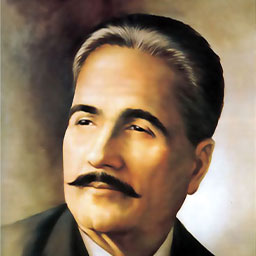Sir Muhammad Iqbal (9 November 1877 – 21 April 1938) was a South Asian Muslim writer, philosopher, and politician, whose poetry in the Urdu language is thought by many to be among the greatest of the twentieth century, and whose vision of a cultural and political ideal for the Muslims of British-ruled India was to animate the impulse for Pakistan. He is commonly referred to by the honorific Allama ( “very knowing, most learned”.)
Born and raised in Sialkot, Punjab (present-day Pakistan) in an ethnic Kashmiri family, Iqbal studied in Sialkot and Lahore, and thereafter in England and Germany. Although he established a law practice after returning, he concentrated primarily on writing scholarly works on politics, economics, history, philosophy, and religion. He is best known for his poetic works, including Asrar-e-Khudi—which brought a knighthood—Rumuz-e-Bekhudi, and the Bang-e-Dara. In Iran, where he is known as Iqbāl-e Lāhorī (Iqbal of Lahore), he is highly regarded for his Persian works.
Iqbal was a strong proponent of the political and spiritual revival of Islamic civilization across the world, but in particular in South Asia; a series of lectures he delivered to this effect were published as The Reconstruction of Religious Thought in Islam. A leader in the All India Muslim League, he envisioned—in his 1930 presidential address—a separate political framework for Muslims in British-ruled India. After the creation of Pakistan in 1947, he was named the national poet there. The anniversary of his birth (Yōm-e Welādat-e Muḥammad Iqbāl) on 9 November is a public holiday in Pakistan.


